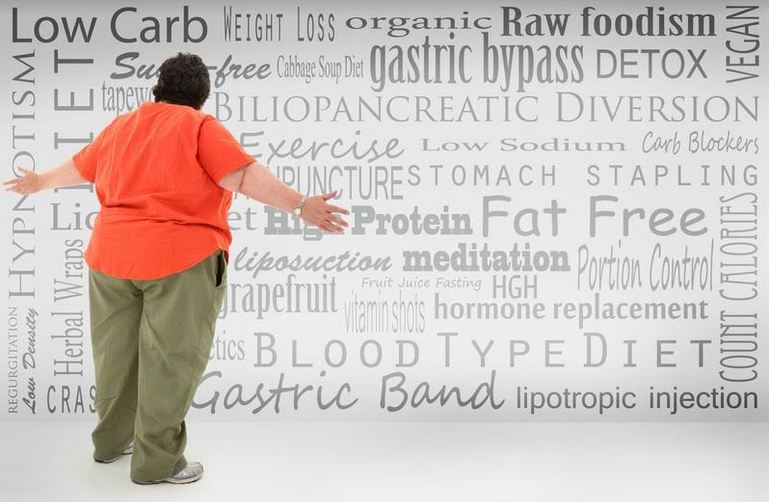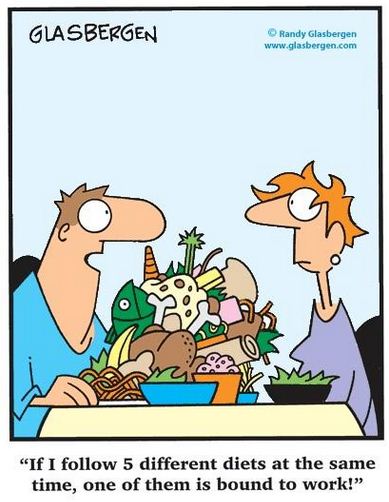What is the four-letter word that can keep you fat?
Our world is a crazy place. For the first time in history more people are at significant nutritional risk from over nutrition instead of malnutrition. But, in most industrialized countries we actually eat fewer calories than we did at the beginning of the 20th Century. How can that be? It’s because we’re  eating quite differently now, and researchers are working on defining how these different types of foods are contributing to the obesity epidemic.
eating quite differently now, and researchers are working on defining how these different types of foods are contributing to the obesity epidemic.
Most health experts agree: as cultures around the world replace traditional whole foods with processed and refined foods, obesity is taking its toll.
As reported by the World Health Organization, “Malnutrition, in every form, presents significant threats to human health. Today the world faces a double burden of malnutrition that includes both under nutrition and overweight, especially in developing countries.
 Hunger and inadequate nutrition contribute to early deaths for mothers, infants and young children, and impaired physical and brain development in the young. At the same time, growing rates of overweight and obesity worldwide are linked to a rise in chronic diseases such as cancer, cardiovascular disease and diabetes — conditions that are life-threatening and very difficult to treat in places with limited resources and already overburdened health systems.”
Hunger and inadequate nutrition contribute to early deaths for mothers, infants and young children, and impaired physical and brain development in the young. At the same time, growing rates of overweight and obesity worldwide are linked to a rise in chronic diseases such as cancer, cardiovascular disease and diabetes — conditions that are life-threatening and very difficult to treat in places with limited resources and already overburdened health systems.”
Obesity has doubled since 2008 in most industrialized nations. Sixty-five percent of the world’s population lives in countries where obesity kills more people yearly than malnutrition, and 42 million children under age 5 were obese in 2013. Obesity is the most deadly noncommunicable disease — although some experts will point out that obesity is communicable — and is becoming the “new normal”.
Obesity is the leading cause of:
- Cardiovascular diseases (mainly heart disease and stroke), which were the leading cause of death in 2012;
- Type 2 diabetes — health experts have coined the term “globesity” to describe the world-wide epidemic
- Chronic kidney disease — type 2 diabetes is the most common cause of kidney failure
- Musculoskeletal disorders (especially osteoarthritis — a highly disabling degenerative disease of the joints)
- Cancer – endometrial, breast, and colon, and associated with esophagus, pancreas, thyroid and gallbladder
You may have made a vow to eat more healthfully, but are struggling to change? It can be awfully difficult to stick to your plan. Food manufacturers spend billions in advertising to tempt us to eat — to eat fast and to eat salty, sweet, and large. People are dining out more frequently, and studies correlate restaurant food with larger portions, sodium, and fat. Living large used to mean living richly and living well. Today, living large means being overweight.
What’s The Best Diet?
Are you thinking, “Gee, I’d like to lose some weight.”?
 In my weight counseling practice, I always ask my clients if they want to lose that weight and regain it within a year? Of course not! But why is it that most people who lose weight regain it…and sometimes even more than they lost originally?
In my weight counseling practice, I always ask my clients if they want to lose that weight and regain it within a year? Of course not! But why is it that most people who lose weight regain it…and sometimes even more than they lost originally?
It’s most likely because they went “on” a diet — which I define as that four-letter word that can keep you fat.
By definition, a “weight loss diet” is structured program that requires eating certain foods in certain amounts. Try this experiment — type “weight loss diet” into your search engine — I just got 154 million hits! Diets range from high protein, low carb to low fat — from vegetarian, to high fat Keto, to high protein Atkins and Dukan, to prescribed portions like the Zone; there’s Suzanne Somers, and Dr. Oz, and Dr. Phil! Dieting isn’t new — and it’s big business. Remember Dr. Stillman’s and The Drinking Man’s diet? What do they all have in common? All “diets” are essentially a set of instructions that leave little room for flexibility or individuality — all tell you what to eat, how much to eat, and some even tell you exactly when to eat.
All diets work, if by “diet” you mean doing something different from your usual intake of food or output of exercise. Even a “chocolate diet” will work — if you restrict yourself to eating only chocolate, in just a day or so you’ll be so bored with chocolate that you’ll find little appetite for more. But, since all you can eat is chocolate, you’ll be following a low-calorie diet. Not a healthy way to go, nor will the diet be sustainable.
However, many dieters find that structure is helpful — someone or some book lays it out for you specifically — some find that too much choice is dangerous. They need someone else to make the choices for them, since their choices are what made them overweight to begin with.
So “diets” can be effective — until they’re not. Until you get bored. Until you say, sigh…I’m tired of this, I want a cheeseburger!
Let’s debunk the belief that a “diet” has to include deprivation. According to most dictionaries, the first definition of “diet” is a noun, as in what you usually eat and drink.
Look to your usual diet. Is it full of fatty, sugary and processed foods? Then that’s the first step.
Begin by identifying the foods and dining habits one by one, that you know are contributing to your overweight — and for each food or habit, choose a substitute instead. Everyone knows their own foods and beverages that are overloaded with sugar and fat. You might also start by eating more slowly. And not eating standing up. It’s shown that by sitting down when you eat, you eat 30% less!
 For example, my nemesis was The BIG Bran Muffin. Each day I’d eat that bran muffin for breakfast, rationalizing that since it contained bran, it was healthy. But gee, that bran muffin had way more calories and sugar and fat than a piece of chocolate cake. Oh yeah, it had some bran, but I was really fooling myself. My “healthy” bran muffin had about 600 calories and was mostly white flour, lots of oil and honey. It contained no protein, calcium or really, any fiber to speak of.
For example, my nemesis was The BIG Bran Muffin. Each day I’d eat that bran muffin for breakfast, rationalizing that since it contained bran, it was healthy. But gee, that bran muffin had way more calories and sugar and fat than a piece of chocolate cake. Oh yeah, it had some bran, but I was really fooling myself. My “healthy” bran muffin had about 600 calories and was mostly white flour, lots of oil and honey. It contained no protein, calcium or really, any fiber to speak of.
My first step toward weight loss was substituting oatmeal or unsugared, high fiber cold cereal, Greek yogurt, and cup of whole fruit (not juice) and ditching the bran muffin. I changed this one thing, and things started to change. I saved hundreds of calories weekly and the pounds started to come off.
And once you’ve identified that first food — or restaurant meal — or habit that is keeping you from reaching your health and weight goal, then identify that substitute. For example, if that big cheeseburger and fries is part of your weekly schedule, consider switching to a grilled chicken sandwich instead. You will save hundreds of calories, sodium and fat calories.
If you typically add cream to your coffee, consider low fat milk instead. Instead of cheese and crackers each evening, crunchy vegetables and salsa saves hundreds of calories and grams of saturated fat, and adds up to pounds lost. Who needs someone else’s diet? YOUR own diet makeover, from your making your own choices, is what will make your diet a healthy one, so you never have to go on a diet again!
And staying active is critical, both for your weight and for your overall physical and mental health. Daily activity is shown to improve insulin resistance, heart health and even fight depression. Lack of activity contributes to obesity. But research is conclusive…you can’t exercise your way to permanent weight loss — weight loss depends on how you fuel your body — along with consistent activity.
Don’t Forget Your Pets
When you’re thinking about achieving a healthy weight, think about your pets. Our pets unfortunately follow the trend toward overweight — and with similar health consequences. Veterinarians report an increase in pet obesity-related illnesses, including heart disease, diabetes, arthritis, hypertension and certain cancers. Keep your pet’s weight within a healthy range. This could add more years to your pet’s life!
Sources
World Health Organization. Nutrition Challenges. http://www.who.int/nutrition/challenges/en/





















